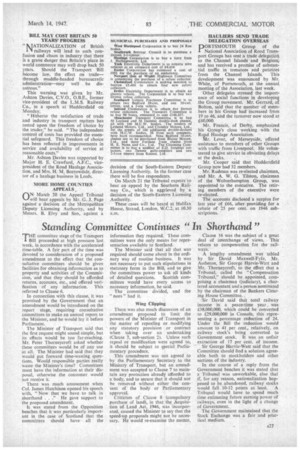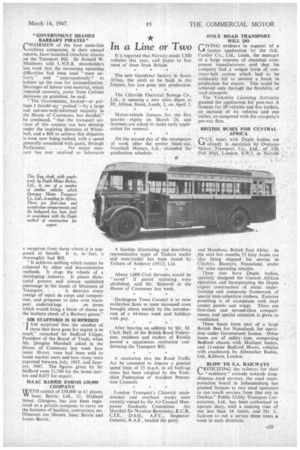Standing Committee Continues CI In Shorthand" T HE committee stage of
Page 29

Page 30

Page 31

If you've noticed an error in this article please click here to report it so we can fix it.
the Transport Bill proceeded at high pressure last week, in accordance with the accelerated time-table. A fair part of the time was devoted to consideration of a proposed amendment to the effect that the consultative committees should be given facilities for obtaining information as to property and activities of the Commission, and that they should be afforded returns, accounts, etc., and offered verification of any information. This referred to Clause 6.
In connection with this clause, it was promised by the Government that an amendment would he introduced on the report stage, requiring consultative committees to make an annual report to the Minister, and he would lay it before Parliament.
The Minister of Transport said that the first request might sound simple, but its effects would be too far-reaching. Mr. Peter Thorneycroft asked whether these committees would be of any use at all. The Minister had said that they would put forward time-wasting questions. Would responsible parties really waste the Minister's time? Committees must have the information at their disposal, otherwise the consumer would not receive it.
There was much amusement when Col. James Hutchison opened his speech with, "Now. that we have to talk in shorthand . ." He gave support to the proposed amendment. It was stated from the Opposition benches that it was particularly important in the case of Scotland that the committees should have all the information they required. These committees were the only means for representation available to Scotland.
The Minister said that all that was required should come about in the ordinary way of routine business. It was not necessary to put such stipulations in statutory form in the Bill, and to give the committees power to ask all kinds
of detailed questions. Scottish committees would have every access to necessary information, he said.
The committee divided, and the " noes " had it.
Wing Clipping There was also much discussion of an amendment proposed to limit the powers of the Minister of Transport in the matter of repealing or modifying any statutory provision or contract when taking over an undertaking (Clause 7, sub-section 2). Unless such repeal or modification were agreed to, it should be subject to special Parliamentary procedure.
This amendment was not agreed to by the Parliamentary Secretary to the Ministry of Transport, but an amendment was accepted to Clause 7 to maintain any protection already afforded to a body, and to secure that it should not be removed without either the consent of the body or Parliamentary approval.
Criticism of Clause 8 (compulsory purchase of land), in that the Acquisition of Land Act, ;1946, was incorporated, caused the Minister to say that the speed-up proposals might not be necessary. He would re-examine the matter. Clause 16 was the subject of a great deal of interchange of views. This relates to compensation for the railways.
A lengthy amendment was tabled by Sir David Maxwell-Fyfe, Mr. Assheton, Sir George Harvie-Watt and Mr. Thorneycroft, to the effect that a Tribunal, called the "Compensation Tribunal," should be appointed, comprising a chairman (judiciary), a chartered accountant and a person nominated by the chairman of the Bankers Clearing House Committee.
Sir David said that total railway income in a peace-time year. was £38,000,000, which could be converted to £29,000,000 in Consols, this representing a percentage reduction of 24. Under the Bill the reduction would amount to 41 per cent., relatively, on railway stock's being converted to Government stock. It was an unfair extraction of 17 per cent. of income. Sir George Harvie-Watt said that the Committee should find a solution agreeable both to stockholders and other sections of the industry.
In the course of a reply from the Government benches it was stated that a Tribunal was unworkable, also that if, for any reason, nationalization happened to be abandoned, railway stocks would fail 10-12 points at least. A Tribunal would have to spend much time estimating future earning power of railways; even in the light of a change of Government.
The Government maintained that the Stock Exchange was a fair and practical medium. JUDGE CRITICIZES M.O.T. CONTRACT
IN a recent case heard before the Manchester Assizes it was stated that a 10-year-old lorry, worth £.189, was 'making a yearly profit of £1,306 on hire to the Ministry of Transport. The operator, Thomas A. Barlow (Poynton), Ltd., claimed £876 18s. 9d. damages from the Manchester Corporation after a bus had collided with the vehicle. A sum. of £281 Is. 5d. would be needed to cover repairs, whilst the balance represented loss of earnings for 22. weeks.
The secretary of the concern said that the Ministry paid £12 15s, 9i for each week the lorry was roadworthy and an additional rate of 4.934:1„ per mile, of which 2.9d. was profit.
"It would appear in the interests of the public that this type of agreement should be overhauled quickly," cornMerited Mr. Justice Singleton. Reptlirs bud been paid for by the insurance corrayaay, so that the haulage concern REMOTE CONTROL APPROVED
AT a 10-hour meeting, Sheffield City Council spent nearly four hours, on March 5, in debating transport nationalization, with particular refuel-Iceto the Sheffield municipal pas.senger transport undertaking Councillor F. Lloyd moved a resolution condemning the Transport Bill, but the
Labour-controlled council adopted, by 41 votes to 17, an amendment cordially approving it. • Remarking that the Bill closely affected the passengers and employees of the undertaking, Councillor Lloyd said he was unable to find in the Bill any benefit either to the passengers or the employees, who would exchange local for remote control.
Nationalization also gave rise to a stormy debate at a meeting of the tabour-controlled Hull City Council on the same day, when by 46 votes to 26 the council expressed agreement with the Government's policy.
At a meeting of another Yorkshire municipal authority, Dew sbury Borough Council, on March 6, Councillor P. G. Lyles said the corporation would' lose the equivalent of a 2s. rate if, through nationalization, it lost its share = of the Yorkshire Woollen District Transport Company's motorbus profits. as well as its gas, water and electricity undertakings.
CO-OPERATION AT PRESTON
DEPENDENT upon the supply of new buses, Preston Corporation hopes to run additional bus services to areas surrounding the town, in cooperation with Ribble Motor Services,
Ltd. Twelve Leylands haverecently been supplied to the corporation, and a further 21 double-deckers are on order with Leyland Motors-, Ltd.
Ribble Motor Services; Ltd., has also placed contracts for a large number of Leylands.
WHERE " LONG HAULS" ARE REALLY LONG IN the mid-Western territory of the USA.. hauls by common carriers,. during the last war year and immediate post-war period, averaged 324 miles, In the South they averaged 267 miles, in the Rocky Mountain territory 237 miles, and in the New England states 127 mites.
These figures were quoted by Mr. J. A. Dunnage in an address to London, members of the Institute of Traffic Administration. It is likely that as normal conditions return, the overall average will approach 300 miles. DRIVERS' RECORDS AND CONTRACT WORK AGISTRATES at Sunderland, last weet, were in. a dilemma when a haulage contractor and his driver appeared before them on five summonses. Finally, although both men pleaded guilty, the cases were dismissed.
Henry i'vfeGurty, Grange Road West, Jarrow, was summoned for failing to carry a record of hours worked, failing to keep such a record up to date and failing to display a current Road Fund licence.
Edward John Frame, of Paint Avenue, South Shields, partner in V. Rollingson and Co., Woodharn Road, Battlebridge, Essex, was summoned for aiding and abetting in the licence summons and for failing to cause a record of hours to be kept.
Frame told the magistrates that a Road Fund licence was applied for on January 11, within the period of grace, but was not received until January 25.
On the second summons against him. Frame said that the vehicle concerned was operating on a contract A licence and was on site work. "I have always understood that a vehicle on site work does not do general haulage and that the driver is not bound to carry a log book, because his times are set and he works with the people on the contract job," he said.
The clerk (Mr. J. P. Wilson), after referring to the regulations governing road transport, said that under the Act there was no mention of contract A licences. and both Frame and McGurty were dealt with under the Probation of Offenders Act,
RETRIEVERS AS BUSES
ELEVEN Leyland Retriever sixwheelers with fully floating rear bogies have been purchased by the Dan Co-operative Society, Ltd., of Palestine, for conversion into one-man-operated buses. The conversion work is to be done by Mr. E. Wertheim, the Society's works manager.
Substantial alterations are to be made to the forward ends of the vehicles, and the controls will be placed in new positions, so that the driver will be more suitably located for the collection of fares. Mr. Wertheim recently flew to England to diseuss'ffie conversion work with Leyland Motors, Ltd. "GOVERNMENT SHAMES BARBARY PIRATES"
CHA1RMEN of the four main-line railway companies, in their annual reports, have launched trenchant attacks on the Transport Bill. Sir Ronald W. Matthews told L.N.E.R. shareholders last week that the increasing operating difficulties had been used "most unfairly" and "unscrupulously " to bolster up the case for nationalization. Shortages of labour and material, which impeded recovery, arose from Cabinet decisions on priorities, he said.
"The Government, backed—or perhaps I should say 'pushed '—by a large and not-too-well-informed majority in the House of Commons, has decided," he continued, "that the transport services of this country can best develop under the inspiring direction of Whitehall, and a Bill to achieve this objective is even now being rushed, with a speed generally associated with panic, through Parliament. . . . No major measure has ever received so lukewarm a reception from those whom it is supposed to benefit. It is, in fact, a thoroughly bad Bill.
"It achieves nothing which cannot be achieved by other and less-restrictive methods. It clogs the wheels of a developing .industry. It places dictatorial powers and almost unlimited patronage in the hands of Ministers of Transport. : . . It destroys every vestige of esprit de corps and competition, and proposes to take over trans port undertakings . . on terms which would bring a blush of shame to the leathery cheek of a Barbary pirate."
SIR STAFFORD IS SURPRISED
IAM surprised that the number of I those that have gone for export is so small," remarked Sir Stafford Cripps, President of the Board of Trade, when Mr. Douglas Marshall asked in the House of Commons last week how many 10-cwt. vans had been sold to home market users and how many were exported between July, 1945, and January, 1947. The figures given by Sir Stafford were 21,740 for the home market and 8,675 for export.
ISAAC BARRIE FORMS I30,000 COMPANY WITH capital of £30,000 in £1 shares, YV Isaac Barrie, Ltd., 32, Midland Street, Glasgow, has just been registered as a private company to carry on the business of hauliers, contractors, etc. Directors are Messrs. Isaac Barrie and James Barrie.




















































































